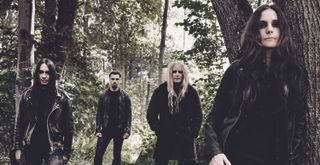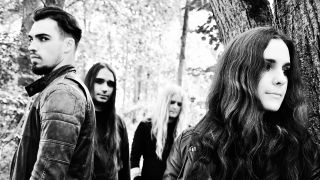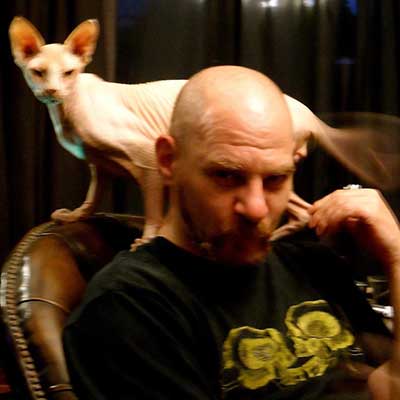As monolithic and single-minded as the metal underground can seem from a distance, any closer inspection will reveal not only an ever-expanding, constantly innovative cauldron of activity, but a fearless resistance to orthodoxy as bands step outside of genre straightjackets, inhale a raft of outside influences and bring psychedelic new perspectives to metal’s true heart of darkness.
But as much as the past few years have seen a rise of bands such as Bölzer, Cult Of Fire and The Ruins Of Beverast – bands for whom the occult isn’t so much as style as a sensibility and a source to be channelled, with infinite scope for interpretation – often it’s those who have taken the long journey from the roots of black metal to the uncharted realms beyond who can cast the most illumination on the spiritual evolution of the scene.
Its foundations laid 20 years ago in the medieval city of Osnabrück, Germany, Secrets Of The Moon’s path has been one of ongoing enlightenment, musical transformation and the prising open of perception. From the murky, militaristic rites of their Stronghold Of Inviolables debut full-length to the imperious if vividly vehement sermons of later albums such as 2009’s Privilegivm and 2012’s Seven Bells, the band have forged a distinctive occultic aura steeled by a conviction that has only ever expanded horizons, to the point where strict genre definitions no longer offer any bearing. Nevertheless, for guitarist Ar, transformation and awareness of continuity are inextricably bound.
“I think you cannot really get rid of your roots,” he explains, “and you shouldn’t. That comes through naturally when me and [vocalist] sG play together in a certain way that is Secrets Of The Moon. But we like a lot of different styles of music and we talk a lot about music and what especially we are trying to find in music. Music speaks to you, and you’re on an everlasting hunt to find it for yourself. It almost doesn’t matter if it’s a really heavy riff or a really fragile and atmospheric arrangement.”
It’s this search for spiritual resonance that’s led the underground scene to make alliances far beyond its musical boundaries, the likes of Dead Can Dance, Fields Of The Nephilim and even the devout, fevered Christianity of Wovenhand becoming talismanic presences in a world sworn to the dark.
“It’s a very interesting situation,” muses Ar, “because black metal is a weird hybrid of something that is very conservative, which is metal – and that’s good, it’s the reason the metal scene is still around and 16-year-old kids listen to Iron Maiden – and the occult and Satanic aspect, which is an ever-expanding principle. You’re trying to discover and experience things that are grotesque and unknown. So it’s very important to try to find inspiration, especially in things that feel weird in the beginning. Maybe black metal just gave us the spark to be ready to experience music that really implies something valuable to you. The more you go on, the more it becomes just the essence of what you’re trying to do.”

For all the through-the-Stargate, pitchbending surge of its opening track, No More Colours, SOTM’s new album, Sun, journeys far beyond realms black metal can claim as its own. Although you can hear elements of previous albums – the doom-laden passages, the blighted shafts of light cast upon the riffs – the space they operate in here feels like a marking out of new, utterly enthralling terrain. The gothicism that’s been seeping into the underground of late makes its presence felt throughout, not least in sG’s wracked vocals, as the ghosts of Bauhaus, The Cure and Scary Monsters-era David Bowie seed a vast and immersive shadow-world that the band traverse over the course of its 53 heart-in-mouth minutes. A raging against the dying of the light, Sun journeys through abandonment, fury, moments of vulnerability and luminous, soul-searching grandeur that feel like a hard-won fight for deliverance.
“I think there are a lot of bands that are embracing those sorts of influences, from goth rock and death rock from the 80s,” says Ar. “It’s very, very atmospheric and very dark music, as black metal was when it started in the 90s. It feels very big and very dreamy and obscure, very impenetrable, where a lot of other more technical metal genres are very concrete.”
Sun feels like a complete world that, once you enter into it, subjects your emotions to new, if spiritually resonant laws of physics. Did the band have a concept that bound the album together, a sense of the realm in which they were operating?
“That title can be pretty much a symbol for it,” says Ar. “The sun is the source of all life, we couldn’t exist without it, but one day it’s going to expand and not even destroy everything that lives; it will make everything like it never happened. So this realm, it’s both; it’s Elysium, but it’s a void at the same time. It’s something that sucks you in and it’s a state of non-existence. It is about accepting the unacceptable, and at the same time it’s about the urge to change it.”
If that tension is Sun’s driving force, it’s one that finds all manner of expression, from Man Behind The Sun’s twilit lament through Hole’s swirling, lustrous deliverance to the fiery sermon of Mark Of Cain, each track is a pilgrimage in its own right, subject to shifting emotional currents that, for all their occult atmosphere, map out a very human endeavour that becomes a transformative experience.
“Altering consciousness is what we’re aiming for,” Ar says, “and this is what an occult attitude towards something should be, that you actually let things take you somewhere. You explore the hidden. You look for things that scare you, that are bigger than you and are dangerous, and you embrace them. Through not running away from them, when you work with them, they will take you somewhere, and when you don’t have this expectation that you are one who is in charge of where the travel takes you, then it actually does something very powerful to you. There’s no evolution without confrontation. You will never get somewhere by avoiding things.”
On October 24, 2003, Secrets Of The Moon’s bassist, LSK, who had played on Privilegivm, as well as with numerous other black metal bands, and contributed to Seven Bells, took her own life. A fiercely willed artist by whose spirit you could measure the black metal ethos, her presence can be felt on Sun in both tangible and intangible ways.
“She was our sister,” says Ar, “and she’s always going to be there in our art. We miss her a lot every day, and she roams through this whole record, and this is something I consider as being the light-filled side of it. Before she died, and when she wasn’t in the band already, the way she expressed it was that she always wished to be the ghost or the shaman in the band. We actually planned to work with her in the record and to give her the freedom to create obscure parts and to put them on the record, and she did on Seven Bells. Probably that happened on a more profound level on Sun. On No More Colours there’s a poem written and read by her. I recorded that poem with her a few years back and I almost forgot about it. We brought it up at some point in the recording and we asked, ‘Is it right to do this?’ We wouldn’t have her permission, and don’t fuck with the dead, but at some point we imported it into the track and they were just right-fitting at this very spot. This is profound for me, because we just recorded it, but not originally for this.”
It perhaps explains why Sun sounds so restless yet devotional, a sense of something bigger than itself that it’s struggling to comprehend. But it’s this awareness that separates the rebirth of the occult from its more orthodox, anti-Christian forebears: not tying yourself to what you’re against but giving open-ended expression to what you’re for.
“I’m way more a fan of ideas than of destroying ideas,” Ar concludes. “It’s very simple and very powerful to say ‘No’ to something or to reject something, but in the end you get way more out of it if you’re experiencing an idea or you let yourself go in an idea. This is what art and the underground music scene should be like, different minds with different ideas with different visions that come together to create something that becomes its own entity. It’s not controllable anymore. It becomes something divine.”
*SUN* IS RELEASED ON DECEMBER 4 VIA PROPHECY/LUPUS LOUNGE

Peers Of The Dark
Three more underground bands reclaiming the story of goth.
Kontinuum
Based in Reykjavik, Kontinuum’s expansive sweep might have some of the breathtaking, landscape-sired atmosphere of Sólstafir and the pulsing, post-punk groove of Beastmilk, but this year’s swoon-inducing Kyrr album has a haunted, spectral quality that’s tuned into the spirit of late-80s goth.
Publicist UK
Featuring members of Municipal Waste, Revocation, Goes Cube and Discordance Axis, Publicist UK’s love of post-punk and goth from both sides of the pond is evident in their Forgive Yourself debut, combining Michael Gira-style vocals and Joy Division-esque isolation to captivating effect.
Coliseum
Forged in the fires of hardcore/punk, this Louisville three-piece have taken on a gothic tinge of late, the tribal grooves and guitar tones like half-spent nuclear fuel rods on their Anxiety’s Kiss album suggesting long hours stomping around to Killing Joke.


